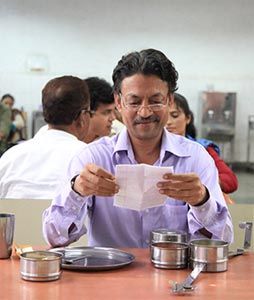 'Please, ye gods of Bollywood: Someday, give us a tightly edited film, with believable characters and dialogue, definitely without endless close-ups of dabbas.'
'Please, ye gods of Bollywood: Someday, give us a tightly edited film, with believable characters and dialogue, definitely without endless close-ups of dabbas.'
'Then maybe you won't need to moan mournfully about missing the Oscar bus with a film that doesn't belong there anyway,' says Dilip D'Souza.
How many close-ups of a dabba must one film pack in?
Well, in the case of The Lunchbox, the best answer might be "several too many". I mean, yes, this is a film that revolves around a dabba -- the eponymous lunchbox, of course -- but did the said dabba really need to fill the screen quite so many times in the course of the film?
And in fact that may stand for my problem with this film. There's just a little too much gratuitous stuff in it: The dabba, the shots of trains and crowds and traffic, the up-in-the-air ending as well. Not forgetting the parents, one of whom dies.
There's much to like about the idea of the film. A quiet romance that sparks and lives in short notes exchanged via dabbawallahs, the first as a result of a mistake: Very nice indeed.
You get a sense of how each of the pair starts forming mental pictures about the other. Their dialogue through their notes says things about each of them without seeming to, without explicit mention.
One of the best things about the film is the way it shows you how quickly the letters become an emotional support for both characters. When Ila sniffs her husband's shirts and finds that telling fragrance of betrayal -- though it may not have been entirely unexpected -- you know she's going to turn to her dabba-confidante for solace.
When Fernandes seeks to come to terms with his impending retirement, it's her letters, and writing back to her, that he finds himself leaning on.
Both Nimrat Kaur and Irrfan Khan are adequate for their roles, and if that sounds like faint praise, it is meant to be.
As the film wore on, I found myself longing for just a touch more passion and energy from both of them.
Why won't Nimrat's Ila indulge in a little shaking up of her rat of a husband?
Why not more to round out Irrfan's Fernandes than yet another scene of him smoking alone and quiet on his balcony?
They talk about an actor's 'restraint', but in this film he seems almost strait-jacketed: he's that wooden most of the time. However reticent a character his Fernandes is, there must be something that occasionally sparks him. Why not show us?
Given the curious lassitude the two leads seem mired in, the real star of the film is the guy who stands for, even embodies, Irrfan's impending retirement. Nawazuddin Siddiqui's Shaikh is the young bright spark -- or so it seems -- who is earmarked to take over at the insurance company from Fernandes.
Watching him on screen, you know you've met fellows like that: Friendly and over-eager to please, something of a resume-padder who will be easily found out -- and for all that, this is still a man who retains a core of dignity that he won't compromise. Siddiqui plays that role with rare grace and authenticity.
More that's positive? Nice shots of the city and its hordes, often captured close enough to smell the sweat. Foreshortened views of trains that emphasise how much like caterpillars they look. Kids who aren't the painfully precocious ones Bollywood seems to produce by the score. A wedding photo-shoot that is hilarious in the way it captures the awkward loneliness of the groom as opposed to the army that is the bride's family. The colleague at the next desk who cannot help looking and is bewildered by this strange new Fernandes.
But... the core of the film is simply not believable enough, and dissatisfying for being so. I mean the exchange of letters between Ila and Fernandes. Sure, she's lonely and desperate. But is it possible that a young woman like her would read an early letter from a still-unknown man that speaks of being touched "down there" in the train, or a slightly later letter that asks "What if we went to Bhutan together?" -- and not stop writing right away?
I'm trying to imagine how this might happen, but with no success at all. And her desperation -- would she really tell a two-short-notes-old correspondent that her husband is having an affair? Would it really drive her to decide to run away to Bhutan?
Besides, what's the deal with the husband? Where does he vanish after his scenes early in the film, and how come he doesn't make more of a fuss about his lunch menu's sudden transmogrification into aloo-gobi and more aloo-gobi?
And Lillete Dubey's part: I've scratched my head for days now, and I still cannot figure what Ila's parents bring to the film. We don't see enough of them to get any substantial sense of the relationship between Ila and her mother. And that Ila would go to their home when her father dies, but not even walk into the room to see him -- this strains credibility to breaking point.
I mean, is it meant to suggest she had a tough relationship with her father? If so, why is this the only indication of it? If not, what's the explanation?
Serious loose ends like these only detract from the story, which I'm sure the makers of the film don't need me to point out.
Finally, what was that ending? Seemed to be there only because the filmmakers have heard that all great love stories leave things unsaid. I'm not looking for pat denouements, but having laid out so much before -- the husband's affair mentioned to the stranger, for example -- why shy away from telling us what happens to Ila and Fernandes?
All in all, an unsatisfactory mish-mash of a film. Sure, it touches you more than the usual foolish Bollywood treatment of romance does -- Jab Tak Hai Jaan, Yeh Jawaani Hai Deewani -- but again, what else is that but faint praise? Is a film good solely because others are bad?
Please, ye gods of Bollywood: Someday, give us a tightly edited film, with believable characters and dialogue, definitely without endless close-ups of dabbas.
Give us that. Then maybe you won't need to moan mournfully about missing the Oscar bus with a film that doesn't belong there anyway.
Image: Irrfan Khan as Sajan Fernandes in The Lunchbox.











 © 2025
© 2025